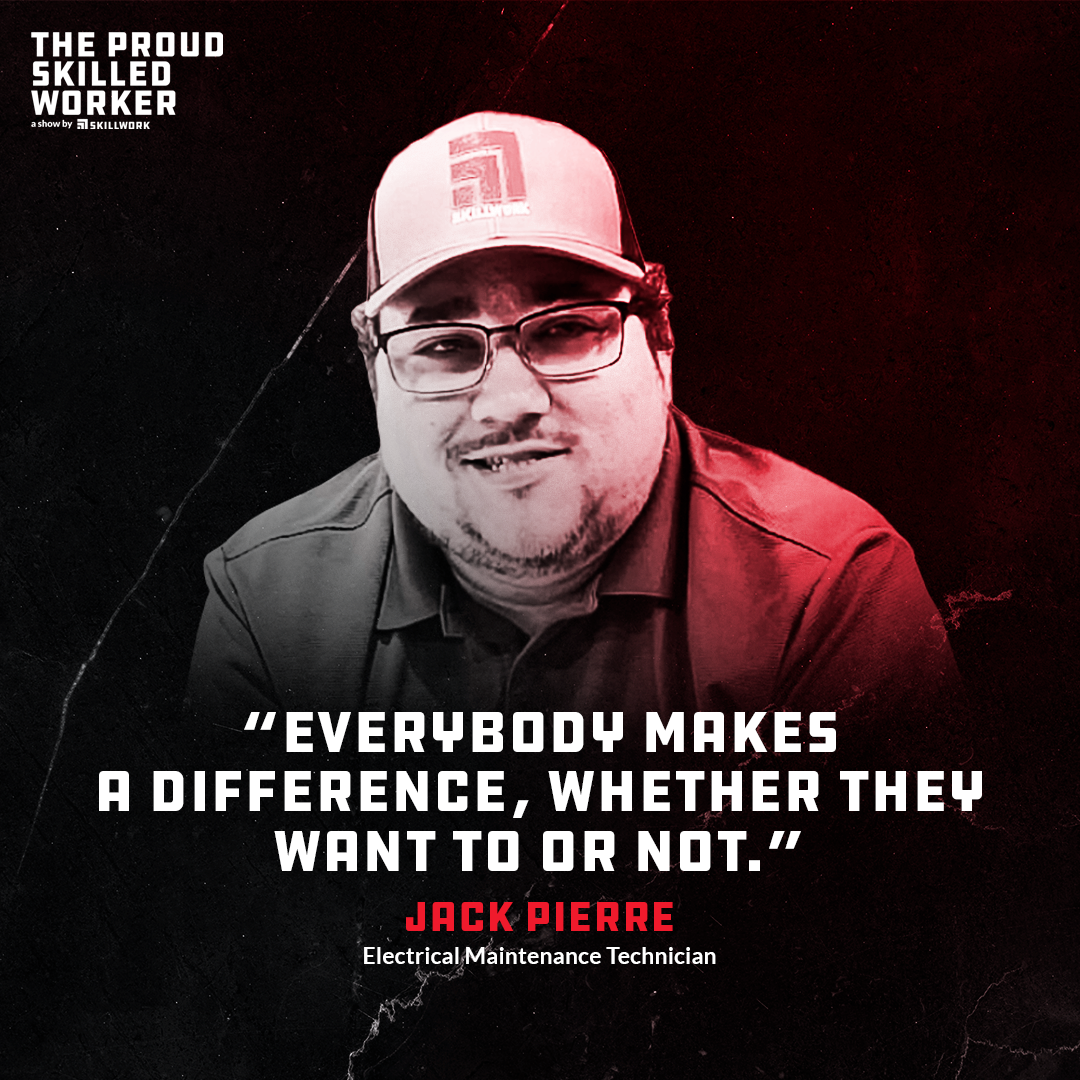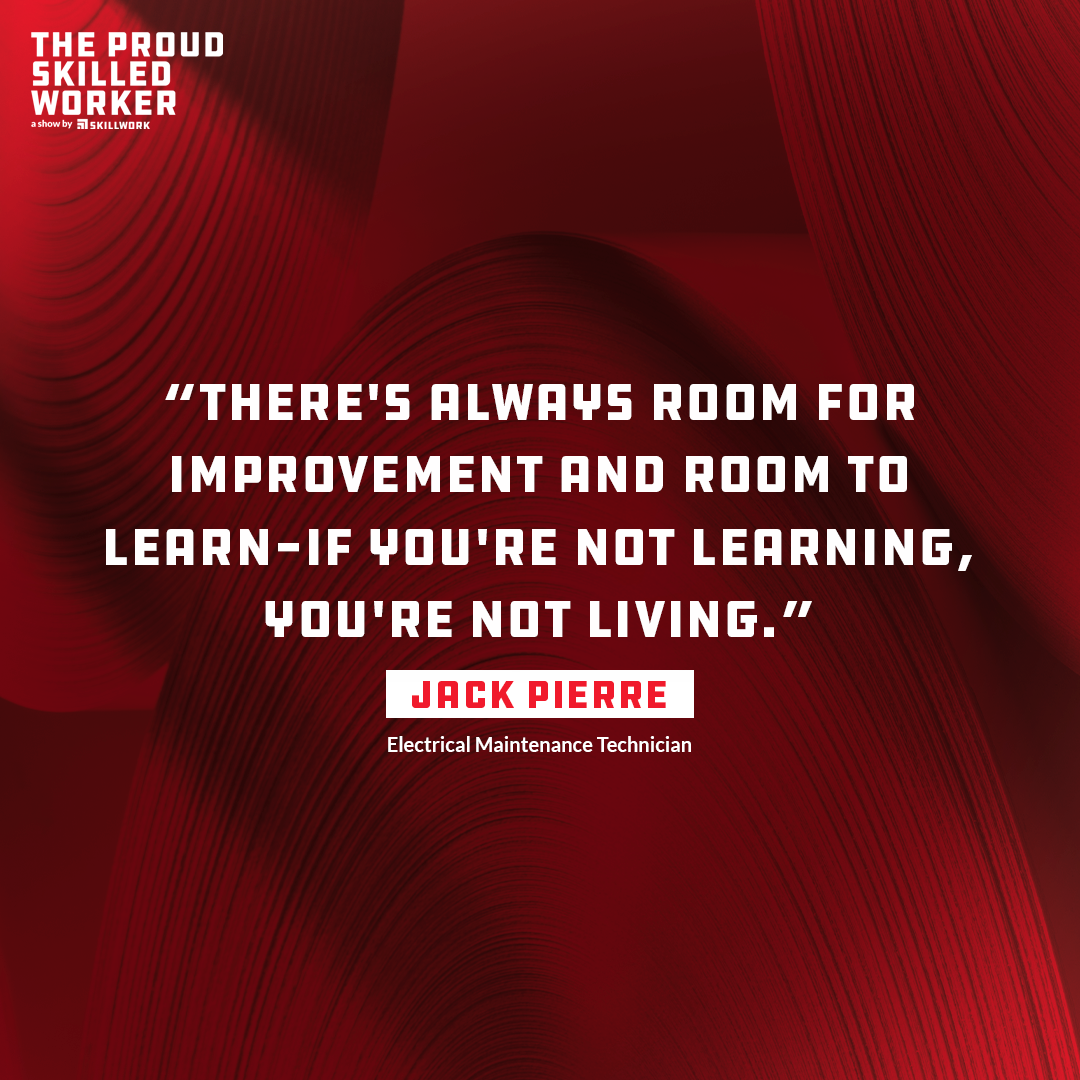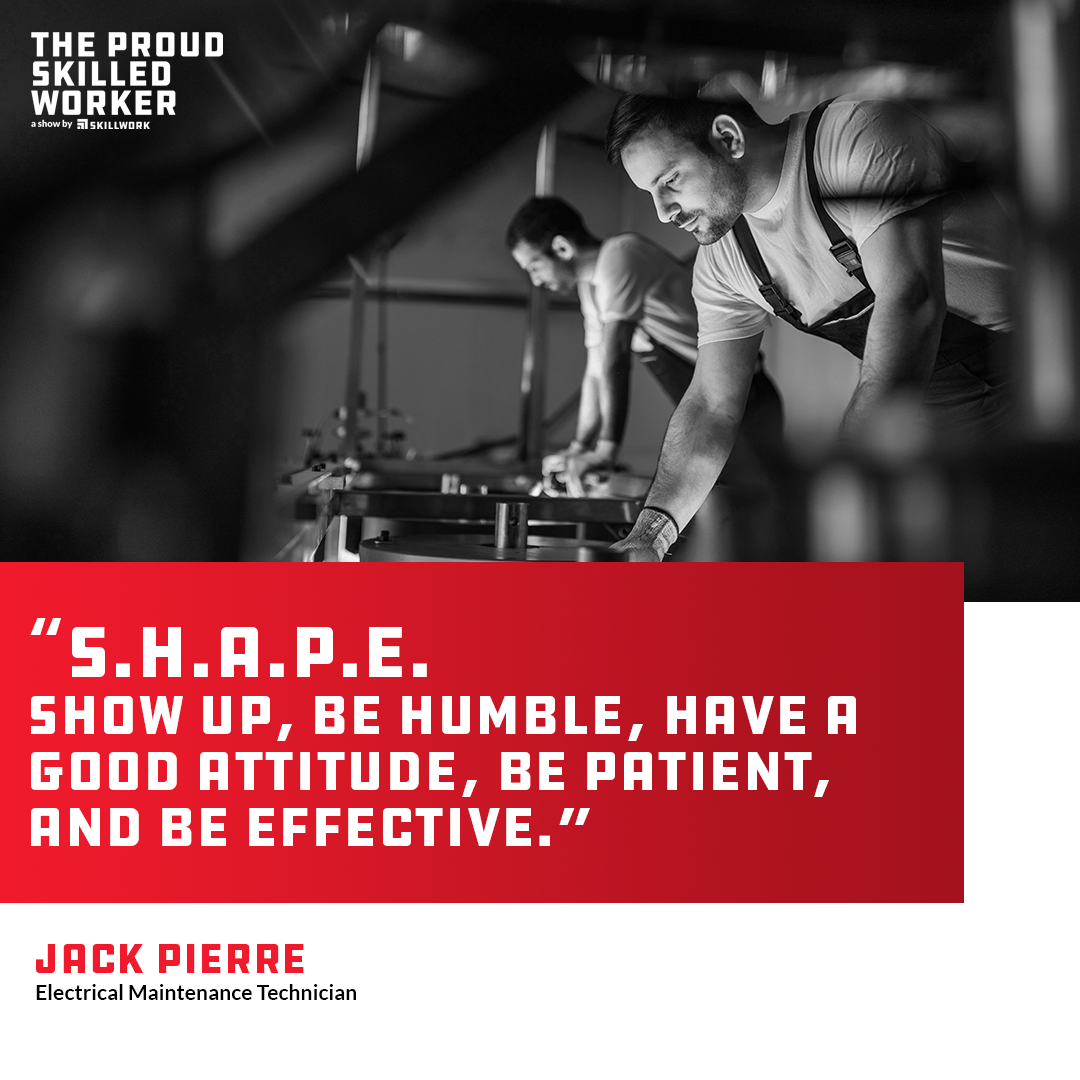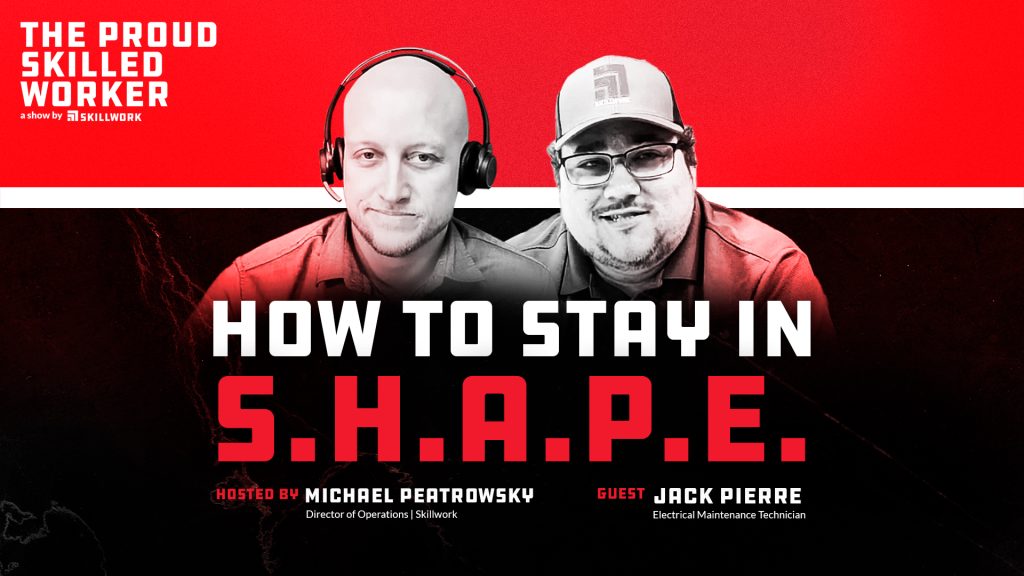
Full Transcription:
Michael Peatrowsky 00:13
Hi, everybody. Good morning, and welcome back to another episode of The Proud Skilled Worker. Today we have an opportunity to interview Jack Pierre, an electrical maintenance technician. We’re gonna jump right in, find out his story and then jump into some of the questions that you guys have for him and we’re gonna let him be the voice of the skilled worker. Jack, how are you today, buddy?
Jack Pierre 00:31
I’m doing well, Michael, how are you?
Michael Peatrowsky 00:34
Good, good. I’m a little jealous. It looks like there’s sun where you are and it’s negative 10 where I am. So what’s going on there Jack? Where are you nowadays?
Jack Pierre 00:42
I’m in DeLand, Florida. It’s about it’s about 75.
Michael Peatrowsky 00:48
No, no, don’t talk to me about that stuff Jack. 75? That’s amazing!
Jack Pierre 00:53
Yeah, it’s pretty nice.
Michael Peatrowsky 00:55
All right, buddy. So talk to me a little bit, how’d you get into skilled trades? How’d you end up in the skilled labor force?

Jack Pierre 01:02
I started off with a job in Minnesota as a instrument tech. And before that, I was a production operator at a plastics facility. And I worked in Minnesota for about 11 months. And then I, I got an opportunity to learn instrumentation there. And that’s actually the moment I found out that I wanted to be in maintenance. I like to fix things, work on things and instrument instruments are part of maintenance, and not just electrically but mechanically as well. So that’s, it kind of just brought everything that I’ve always wanted to do together.
Michael Peatrowsky 01:59
So you went from production into the maintenance and then into instrumentation or instrumentation and then kind of tied your maintenance into that?
Jack Pierre 02:06
I started off at a little plastic facility in Smitty’s as a production plastics operator. I basically ran the machines that made plastic bottles. And, well, I did pretty good at that, and I started working on my own machine, you know? If something was out I’d say, “Hey, what’s what’s going on? Why’s my machine’s not working?” I’d start looking at it. And, yeah, I jumped right in and trying to figure it out and so the maintenance guys, they’d seen that there, and then they called me into maintenance. Worked there for a short time. And then I got the opportunity to go to Minnesota, and kind of a rare opportunity to go to Minnesota. I worked for a company called Southern Company. They were commissioning and starting up a power unit for a power plant in Mankato, Minnesota. So I got an opportunity to jump on with them on their commissioning team. And I learned a lot in Minnesota, but uh, you know, I wasn’t sure about it, when I was still in production and learning, you know, how to fix my own machine. But when I got to Minnesota, started learning so many different things. It really opened my eyes up. And that’s when I knew I wanted to be in maintenance.
Michael Peatrowsky 03:41
Just fell in love with maintenance once you started doing it?
Jack Pierre 03:45
Yeah.
Michael Peatrowsky 03:46
Good. So in all that transition, I mean, you went from plastics on a on a production line, and then kind of a production maintainer, and then into some maintenance and then into a completely separate career field. Still doing maintenance, but in a very different world than what it sounds like an interior plastic injection mold plant would be. What’s been your biggest challenge, Jack? Like what’s been the biggest challenge for you in your career in the beginning?
Jack Pierre 04:11
The biggest challenge for me is probably learning. I, you know, I don’t have any, I mean, I have college, but it’s more, you know, I went to college for criminal justice. So I didn’t really learn any, you know, mechanical trade or anything like that. I mean, I’ve tinkered with small engines before and I’ve worked on cars here and there with friends and family. But I’ve never really had any type of, I guess, professional education in the maintenance world at all. And so it was difficult for me to understand how things work by somebody just telling me what it is, you know, like a contactor or, you know, power supply or, you know, a fuse box. I mean, yeah, that might seem simple enough to some people, but, you know, when you really start to dig into it and actually understand how all those components work, without seeing it, you, you don’t really know what it looks like. So seeing new things, learning what they do, what they are. Yeah, I wouldn’t say it’s a challenge. But that’s probably the hardest thing for me. I mean, moving around, really isn’t that hard for me right now.
Michael Peatrowsky 05:45
So from here, we just kind of jump into questions, Jack. And we get we ended up getting somewhere in the ballpark of 4 or 500 questions that were asked to us through our tool bag giveaway that we just did. We announced the winner of yesterday. So congratulations, again, to the winner of that, but we’re gonna jump right in. And this first question is kind of a two parter from Francisco G. And so first question he asks is how is my job actually making a difference? So he wants to know, how am I making a difference? How do you feel that as a technician, as a as a maintenance guy, how do you really like find the value in what you do?
Jack Pierre 06:19
Yes, sir. Um, well, I believe everybody makes a difference, whether they want to or not. It depends on your choices of what a difference that is. On a community standpoint, I make a difference where I’m at right now, because of the products that I supply maintenance to. I perform maintenance on machines that fill juice, that serves the community in hospitals, in schools, retirement homes, stores, etc. So, you know, that’s, that’s on a big picture of making a difference. But personally, I felt like I make a difference. Because it’s kind of hard to tell if you’re making a difference sometimes. But I believe if you, you know, if you have people that you know, depend on you, and you wake up every day, and you go to work, whether you want to or not, you know, you’re making a difference somewhere in their life. Whether it’s your own family, or somebody else’s family, or even your co workers. Because if you decide not to go in to work, you’re not just affecting your own paycheck, you’re affecting your co workers as well, and just kind of goes along the lines of caring for others. So you know, you want to be dependable, it can show you that you’re making a difference when you show up and people’s like, “alright, Jacks here, he’s going to save the day” or, you know, “Rick’s here, he’s gonna save the day”. I’m sorry, buddy, Rick. Whoever it may be, they know that when they they know that they have somebody to call, and they’re going to show up. Yeah,

Michael Peatrowsky 08:12
No, I love it. I think that, that mindset, so that’s not a mindset I’ve ever actually, like gotten into from a maintenance field of what you talked about in the beginning of like the community and the impact you’re having on people like, it’d be really easy to convince yourself, “I’m working at a juice facility. And that’s what matters”. But you’re, the way you look at it is, “I’m working in a juice facility to provide juice to all of these communities and all these people”. It’s, it’s if you get so narrow in what you’re doing, and your view that you forget about the positive, you could for sure, kind of feel like it doesn’t matter because you’re fixing the same machines over and over again. But at the end, it’s “I’m fixing this machine, because look at all the look at all the back end value that it’s providing for the community and for the common just everybody”. And that’s an interesting, like thought process. And then even you hit on this as well, like when you call in, it affects your paycheck. But then look at all these other people who are touched by those moments where you’re not there to be the hero or they don’t get to go home. That’s it’s super fascinating to see, like from the maintenance floor, like, hey, when somebody calls in who does that really affect that effect? Does it affect the people on the floor? Or the bottom line of the company? Or really, what’s the impact? So Francisco follows this on and he goes, and what skills do I need to grow in order to feel like I’m making a difference? So what do you think the skills that someone needs to have to make that difference are?
Jack Pierre 09:36
That’s kind of a hard one too, but to narrow it down, I would say to stay in shape. One and when I say that means I would say show up, be humble, have a good attitude, be patient, and be effective. Show up. Be dependable, be be there when you’re called upon. Show them that you’re the man, you know? They’ve got a problem, you’re there to fix it, you know? Be humble, as in, don’t ever think that you’re the top dog, you’re the smartest one out there. Because, you know, none of us are, there’s always room for improvement, always room to learn. If you’re not learning and you’re not living, honestly. Attitude, you got to have a good attitude, you know? If you don’t have a good attitude, things can go south real quick. And we all know that. You want you want to be you want to have whatever your attitude is, you always want to have a positive outcome. So if you there’s all there’s always different reasons for someone’s attitude change, but, you know, be as positive as you can. Any negativity doesn’t work for any any work, environment at all, you know? Whether it’s production, finance, maintenance, whatever you want, bankers, any negative attitude, doesn’t really work in any field. I mean, it only causes heartache and hardship. And then be patient. So patience is a lot is one thing that I feel like most, most maintenance people struggle with most maintenance people, you know, they have a list that’s like, through the roof that they have to do, every day, you know? And it never get, it seems like it never gets shorter, it only grows. So you know, of course, when you get the call to go out and look at the equipment and try to fix the machine, you’re already thinking about, “Oh my gosh. You know now I just got something else added to my plate”. But be patient and see the when, when you when you get there, see the problem for what it is, you know? Don’t be of course, you want to go ahead and take care of it and say, “oh, yeah, that’s the problem right there”, fix it and walk away. But see the problem for it is, watch the machine run. After you do the repair, watch it run after you do the repair as well, you know? You know everything is squared away, and you can go on with your list. And then the last one is be effective. You know, don’t just show up with a good attitude we just talked about, you want to make that difference. You want to get that machine fixed. You want to get their line back up and going. So don’t just have that attitude of, I’m just gonna go out there and tell them what they want to hear or do something. And “yeah, it might work it might not”, no. You know? Show up and act like you want to be there. You want to figure out their problem. That goes a long ways. With with anybody.
Michael Peatrowsky 12:51
Yeah, that acronym SHAPE. I mean, that just blew my mind right now as we sit here, because those are all things that all of us struggle with at some point in our life, right? Like, show up, be humble, have a good attitude, be patient, be effective, like those are all things that any given day we could struggle with. But it’s so simple when you boil it down, like “hey, what are the five things I need to do to win at my job?” Those five things, be in SHAPE. I’ve, that’s great, I think that that’s a fun acronym one, especially for me, I’m gonna steal it. Two, you can use it in any season of your life. It’s not maintenance based, like you could switch this to to your kids, you could use this in your own life, your finances, like that’s, it’s such a simple thing that you can apply to every piece of of your life and you can share with others. So that’s huge. And I think that, Francisco, if you’re listening, I think that would be the thing to do is “okay, how do I get in SHAPE? What’s my thing? Like, where am I going to be and in which area do you need to struggle and grow in? Because we all do. So that’s awesome. Thanks so much, Jack. I think I think next question here kind of comes from Timothy D. This is a tie in a little bit to that question and in great job, Timothy for this question is, how do you find a company that will treat you like an individual and not a number? Kind of just in the mill?
Jack Pierre 14:08
Yeah, you know, that’s another tough question, it really is. As a company, a company wants, you know, most companies want more profit than cost or expense, you know? It’s just, and that’s exactly what we want as well. You know, we want to make more money and not do as much. I mean, honestly, that’s, that’s how everybody works. When you’re out there looking for a company. Nowadays, it’s a little easier, it is you can actually look up reviews on that company and real reviews from people that worked there before, you can go to their website or maybe look up news articles for this company, you know? Do a little research on on it, you know. Is the company growing or is it is it put out a article at least once a year or two times a year? And, you know, is it expanding? Or have you not heard of anything about this company since the day they started? They started, they have big blowout, a big ribbon cut, and then that’s it, you know, it’s been 15 years. Just like, where did this company go on the map? You know, in my opinion. I mean, this just what I’ve seen, most companies that you don’t hear from they, you know, maybe they’re not doing quite as well. I don’t know, that’s, you know, ask questions, whether it’s people that work there, or people that know, people that work there, you know? Ask as many questions as you can. Do as much research as you can. Real people reviews, networking, you know? Build, build a network of people that are in the same field as you that work at numerous different companies, even if it’s like two or three people in your community, it’s like, you know, if you work at a chocolate factory, and you’re a maintenance guy at a chocolate factory, and then you got another guy over here, he works at another factory, and then you got a third guy that works at another factory. If you know, if you know, just one person that might know them, you know, communicate, you know, you know, ask them, “Hey, how is it over there?” You know, that way you can build a type of sense of what you should expect. Let’s be frugal. No, company is the same, but that’s a hard question. But all I can say to that is become, you know, don’t just be an employee somewhere, be an asset. Be somebody that the company, not necessarily doesn’t want to lose, but they just want in general, and they make they want that person. And, honestly, hands down, Skillwork has done a phenomenal job with that. We’re getting checked on every week. You know, we’re getting we’re getting so much out of Skillwork. I mean, we have support when we’re moving. We have people now we have a support team. Transition Team, I believe, you know, they’re they’re helping us find places to go to, telling us about the area we’re going to you know? Honestly, the recruiters, man, the recruiters are just phenomenal. They they lay everything out on the table, there’s, there’s hardly any questions. Well, in my experience, there hasn’t been you know? We, I mean, there are few questions, but they’re answered immediately. It’s like you already have a checklist waiting for waiting for me to ask if I “Oh, yeah, that’s right there”. But it’s not it’s not just that, though. It’s, it’s a real answer. Skillwork is done a phenomenal job with showing me that I’m important and that I matter. And y’all appreciate me. Back to the question, you know, I’ll finish that question with this. It’s a two way street. When you’re working for somebody, you can’t expect them to give you their best if you don’t give them your best. And saying that you want to, like we said back in the staying in SHAPE. You want to be, you want to show up and be dependable. Show them that you want to be there. If you walked in every day dragging your head dragging your feet, just another day at the office. Yeah, they’re gonna be like, “Man, what’s wrong with that guy? Does he not want to be here?” You know, and if you do your best, you should expect them to do their best for you. That’s all I can say about that.
Michael Peatrowsky 18:53
I think I think one thing that people forget about this and Jack, you hit on this a little bit in the in the two way street part is that interviews are two ways. So like, when you’re interviewing with a company, it’s your responsibility to ask the questions that you want to know too. Like, what’s your culture like? Hey, how do you treat your employees? And if if the people interviewing you struggle to answer the question, what’s your culture like? Or how are you? You have your answer. I’m gonna be honest with you. If if people struggle through that answer, you know it. And I don’t mean to say anything bad about it, and I’m not going to but if what matters to you most is being is being cared for and mattering, you have to ask how do you treat your employees? We we all too too often go in interviews, and everybody’s guilty of this, and go “I don’t have any questions. Thank you for your time”. Because we don’t want to we don’t want to rattle the pot. We don’t want to ruin an opportunity. Ask those questions that matter to you in those moments, so you don’t end up in those situations like like you just described of, “I’m going in, I don’t really want to be here. I’m hanging my head”. Because it’s hard to do your best and be your best at a place that’s not best for you. And that’s just the reality of it. I appreciate, I don’t want to skip over this. I appreciate all of the great things Jack that you said about Skillwork, about the team that we have here, about what we’re able to provide you. That’s, that’s a huge testament to our actual on are on the floor team. Our recruiters, our everybody. I appreciate all of those kind words, I know they do as well. It means a lot to us to be able to make an impact in people’s lives. And it means a lot to us to actually hear people say, “I love it there”. So thank you, so I don’t want to breeze past that and pretend like that’s not something. Yes, that’s I love hearing it. And it ties into this next question. And this is more about this, this question is from Cambrin. H. So this is, once you become a skilled worker, and not with Skillwork necessarily, but a skilled worker, so someone in the field. What’s a good way to maintain being successful? And, and you’ve kind of hit on this already and all of these other two questions, but I think, what is what are two skills that you think you’ve had, and you have that have been across all of the industries, whether it’s production, production, maintenance, plastics, the energy field, the startup? What’s the skills that you have, that you would tell every skilled worker, this is

